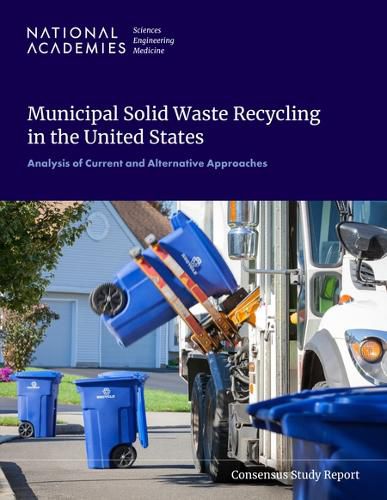Readings Newsletter
Become a Readings Member to make your shopping experience even easier.
Sign in or sign up for free!
You’re not far away from qualifying for FREE standard shipping within Australia
You’ve qualified for FREE standard shipping within Australia
The cart is loading…






The United States generated approximately 292 million tons of municipal solid waste (MSW) annually, most of which (about 68 percent) were not recycled or composted. Recycling programs face a multitude of challenges today that complicate their stability, efficacy, and economic efficiency. However, a well-designed and supported MSW recycling programs hold many economic and environmental benefits. This report, produced at the request of Congress, reviews available information on MSW recycling programs in municipal, county, state, and tribal governments and provides advice on potential policy options for more effective implementation.
Municipal Solid Waste Recycling in the United States explores the contemporary issues facing MSW recycling programs and lays out recommendations and policy options to chart a path forward. Using diverse case studies and publicly available data, this report includes an analysis of economic and programmatic costs of recycling programs and assessment of material-specific recycling approaches. Recommendations include policy options to support effective, economically viable, and environmentally sound recycling practices.
Table of Contents
Front Matter Summary 1 Introduction 2 Municipal Solid Waste Management and Recycling Systems 3 Benefits and Challenges of Recycling Programs and the Role of Policy 4 Direct Costs and Financing of Recycling Programs 5 Materials and Markets 6 Behavioral Considerations and Social Impacts of Recycling Programs 7 Benefits and Measuring Environmental Impacts and Externalities of Recycling Programs Appendix A: Committee Member Biographical Sketches Appendix B: Disclosure of Unavoidable Conflict of Interest Appendix C: Public Meeting Agendas
$9.00 standard shipping within Australia
FREE standard shipping within Australia for orders over $100.00
Express & International shipping calculated at checkout
The United States generated approximately 292 million tons of municipal solid waste (MSW) annually, most of which (about 68 percent) were not recycled or composted. Recycling programs face a multitude of challenges today that complicate their stability, efficacy, and economic efficiency. However, a well-designed and supported MSW recycling programs hold many economic and environmental benefits. This report, produced at the request of Congress, reviews available information on MSW recycling programs in municipal, county, state, and tribal governments and provides advice on potential policy options for more effective implementation.
Municipal Solid Waste Recycling in the United States explores the contemporary issues facing MSW recycling programs and lays out recommendations and policy options to chart a path forward. Using diverse case studies and publicly available data, this report includes an analysis of economic and programmatic costs of recycling programs and assessment of material-specific recycling approaches. Recommendations include policy options to support effective, economically viable, and environmentally sound recycling practices.
Table of Contents
Front Matter Summary 1 Introduction 2 Municipal Solid Waste Management and Recycling Systems 3 Benefits and Challenges of Recycling Programs and the Role of Policy 4 Direct Costs and Financing of Recycling Programs 5 Materials and Markets 6 Behavioral Considerations and Social Impacts of Recycling Programs 7 Benefits and Measuring Environmental Impacts and Externalities of Recycling Programs Appendix A: Committee Member Biographical Sketches Appendix B: Disclosure of Unavoidable Conflict of Interest Appendix C: Public Meeting Agendas